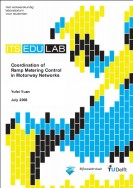This MSc report studies a new ramp metering algorithm. Ramp metering has been introduced on the Amsterdam A10 beltway several years ago. In the near future, the remaining main on-ramps along the beltway A10 will be equipped with ramp metering as well. In addition, a new algorithm (HERO) for coordinated control of the whole ramp metering system will be initiated. However, the effects and consequences of this implementation are unclear to the Dutch government and therefore an simulation study was performed, assessing the new control algorithm by comparing coordinated ramp metering to no control and local control. Also, possible improvements of the HERO algorithm were investigated within the project as well.
Based on the results of simulation, the report concludes that the HERO coordinated control outperforms the non-coordinated local ramp metering control. The improvement on average travel time on the main study area in the HERO network is 2% compared to non-coordinated control case, and 26% compared to no-control case. It is able to postpone congestion on the motorway at the expense of inducing more delay on the on-ramps. Furthermore, optimal parameter settings were found for the control algorithm taking the specific traffic network of the A10-West into account.
